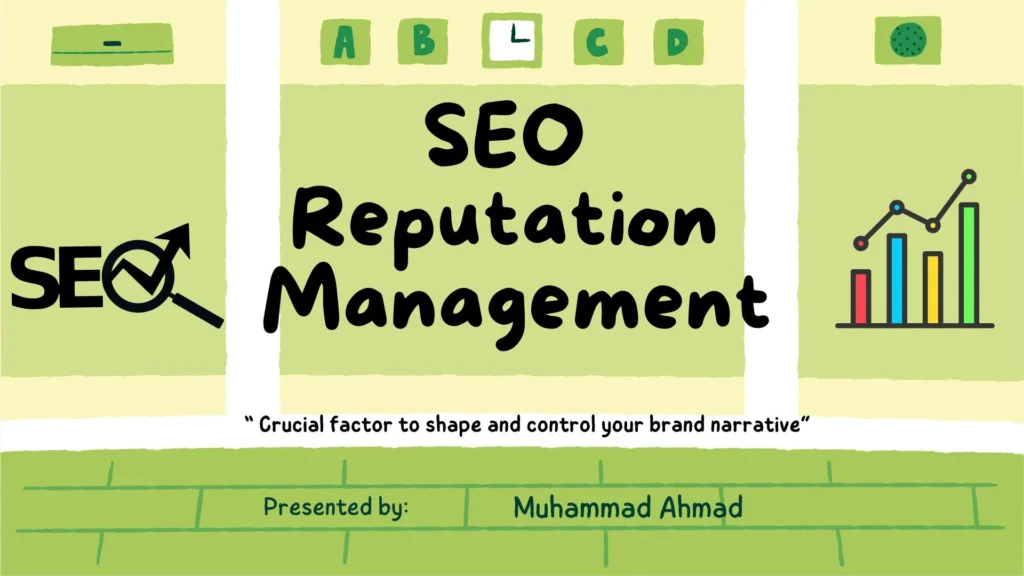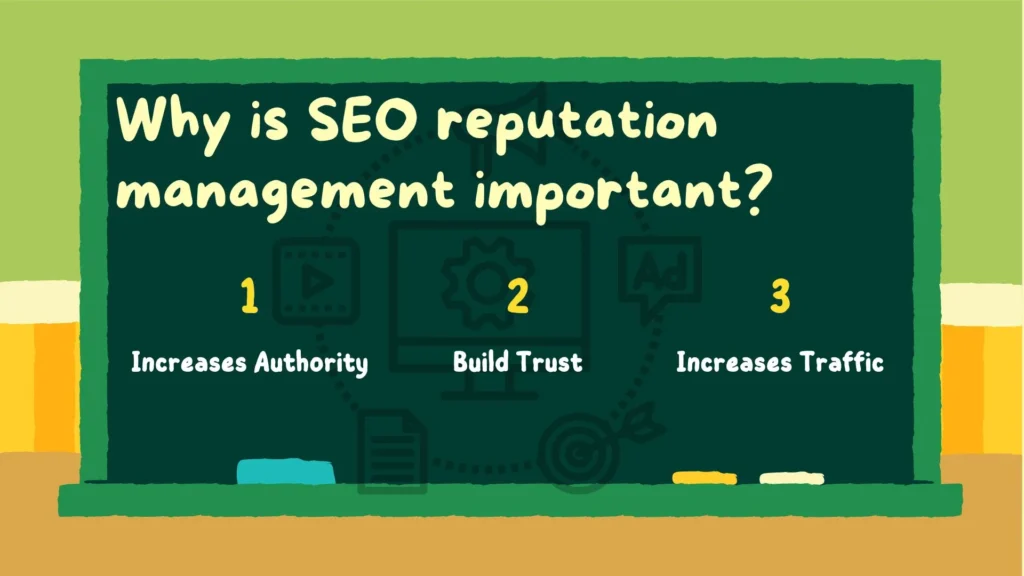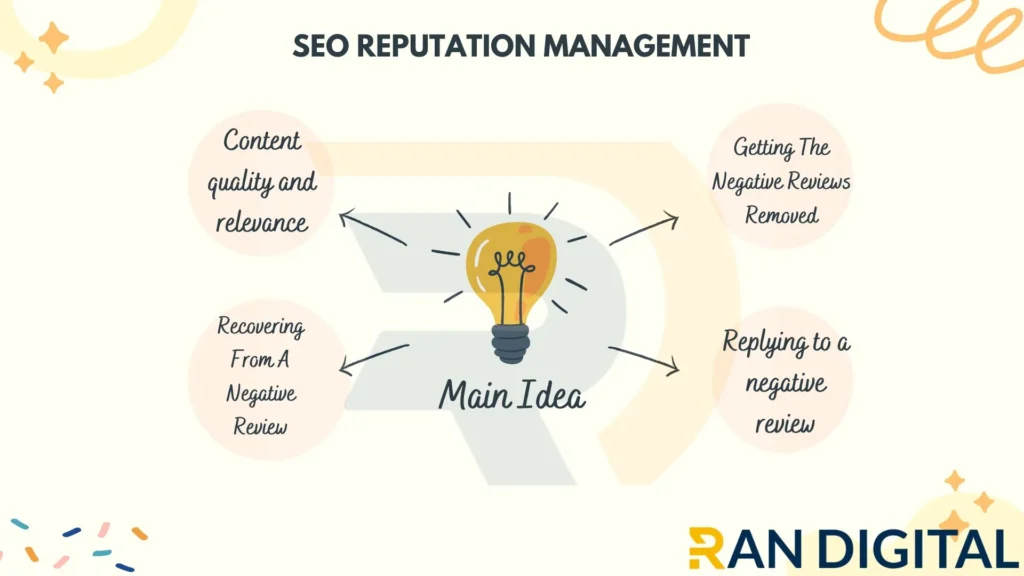RAN DIGITAL | Performance Driven Agency

SEO Reputation Management: Building Trust and Authority Online

Table of Contents

SEO is a crucial factor to shape and control your brand narrative. Neglecting your reputation management SEO strategy can result in a massive loss to your business. Neglecting this can lead to both loss of trust and authority.
Many people fail to recognize the influence of SEO reputation management on their businesses but still, some people understand its importance. If someone has written something about your business that is incorrect or misleading, this article is for you. Today we will guide you:
1- What is SEO reputation management?
2- Why is SEO reputation management important?
3- Crucial steps to keep in mind for building a business’s reputation effectively online.
What is SEO reputation management?
SEO reputation management is the process of monitoring and maintaining positive thoughts and creating a good image of your business across the Internet.
Online reputation management shows customers their opinions matter and encourages them to contact you directly if they have an issue.
Google and all other social media platforms where people leave reviews are important and require maintenance.
Why is SEO Reputation Management Important?
If there are bad reviews about your company on any platform, it could be pulled into Google’s search results. For example, imagine having 100 reviews and 75 are good but only 25 are bad. That only 25% can turn your business upside down. It provides a bad image to your current audience as well as the future audience which can destroy your trust and authority.

If the perception of a brand is negative, it will struggle to get clicks. Moreover, search engine result page (SERP) will also be affected.
With bad reviews, they will face fewer clicks and lesser authority, and the trust of their audience ultimately decreases.
Major Reason for Management Analysis:

Research into a brand, product, or service often begins with a search on any platform. Your website will likely be one or two of the results brought up when someone searches for your brand.
All those other search results or brands will potentially say something about your brand that might not be as favorable as you would like. It may be true or they might be just misleading your audience and that’s the major reason why negative reviews happen.
How does SEO Contribute to Building Trust and Authority?
Both Search Engine Optimization (SEO) and reputation management are interlinked. SEO strategies can push down negative content or reviews in search rankings by promoting more favorable content. This is important for mitigating the impact of negative press or reviews on your brand’s reputation.
If a scandal arises against your brand, there is a high chance that it will spread like a fire in the forest no matter if it is true or not. People search more about it and that’s where SEO comes in. SEO helps maintain consistent messaging across all online platforms, reinforcing your brand’s values and building long-term trust with your audience.

Content Quality and Relevance
SEO involves creating useful content or enhancing the already written content properly. This practice not only helps the audience but also gives answers to their questions.
Content quality matters a lot. If your content is not easily understood by your audience then no matter how much hard work you have done it may still end in vain.
It is also the responsibility of SEO professionals to reply, remove, and recover.
Recovering From A Negative Review:
It is the responsibility of the SEO professional to recover the loss from the negative review.
It involves responding professionally to your audience. Firstly acknowledge the issue then offer a solution, and show a genuine willingness to improve.
By resolving the problem and engaging constructively with the reviewer, you can turn a negative experience into a positive one rebuilding trust in your brand.
Getting The Negative Reviews Removed:
Getting negative reviews removed involves identifying reviews that are false, misleading, or violate platform guidelines.
You can report these to the platform, providing evidence to support your case. If the review is unjustified the platform may take it down automatically.
It’s important to handle this process carefully, as transparency and honesty are key to maintaining your brand’s credibility while addressing unfair criticism.
Replying to a Negative Review:
Acknowledging the reviewer’s concerns with a calm and professional tone is the best practice to respond to a negative comment.
Firstly thank them for their feedback, then address the issues they’ve raised and offer a solution or an explanation.
You have to make them believe that you’re committed to resolving the problem and improving their experience. This not only helps to strengthen the relationship with the reviewer but also has a strong impact on other customers.
11 Search Engine Reputation Management Tips:
1. Monitor your online presence
Search Results
Search for your brand/business name on Google and other search engines to see what content appears on top. Pay special attention to both the first page results and any content that may be ranking lower but could move up over time.
Track your online presence
Regularly track what’s being said about your brand. Tools like Google Alerts, Mention, and SEMrush are mostly used. Staying informed allows you to respond quickly to any negative content.
Competitor Monitoring
Keep an eye on how your competitors are emerging in search engine results for similar keywords. This can provide insights into areas that you have not thought about earlier and have been neglecting it. By this process, you can easily monitor where your business needs improvement.
2. Optimize positive content
Targeted Keywords
Find the ranking keywords and integrate these keywords naturally into your content, including in titles, meta descriptions, headers, and throughout the body text. This helps search engines understand the context and relevance of your content, boosting its visibility and creating a strong trust authority.
Perform keyword research to identify search terms relevant to your brand and resonate with your target audience.
Use SEO techniques to ensure this content ranks high on search engine results pages (SERPs), pushing negative content lower
For the best keyword research techniques read the article “Mastering keyword research in SEO” by RAN DIGITAL.
3. Encourage positive reviews
Encourage satisfied customers to leave a positive response on your review page.
You can use those positive reviews to attract other people towards your brand.
This not only will attract new audience but also help to recover the loss of some negative reviews.
A higher volume of positive reviews can help balance any negative content.
4. Respond to negative content
Acknowledging the reviewer’s concerns with a calm and professional tone is the best practice to respond to a negative comment.
Firstly thank them for their feedback, then address the issues they’ve raised and offer a solution or an explanation.
You have to make them believe that you’re committed to resolving the problem and improving their experience.
This not only helps to improve the relationship with the reviewer but also has a strong impact on all other audience.
5. Set up a Google Business Profile
Your Google business profile may be the first thing the customers encounter when searching for your brand.
It helps to connect customers across different channels and strengthen trust between customers and the owner.
It is the best way to communicate because you can answer the customer’s reviews and their questions.
This type of engagement can help you build trust with potential customers and improve customer loyalty.
6. Active engagement on social media
Maintain your active presence on social media platforms.
By active engagement, there are high chances to attract the right audience leading to good trust building.
Share updates, and respond to feedback to build a loyal community.
7. Build a strong backlink profile
Backlinks from reputable sites boost your business’s trust and authority online.
It helps push down negative reviews or articles by promoting positive content.
When you have a strong backlink, it helps the new audience build trust in you and also increases your authority.
8. Disown harmful links
Look for spam, irrelevant, and harmful links on your website.
Go to the Google Search Console and navigate to the Disavow Links Tool.
Follow the instructions to upload your disavow file. Google will process the file and exclude the specified links from influencing your site’s rankings.
9. Be newsworthy for the right reasons
To see what perspective your customers have towards your brand, you can use Google Alert.
Manage to get your content in the top ranking in a positive way.
See what are the latest reviews of the people regarding your content. Maybe the reviewer has come across the negative side of your content.
You can correct them about the misinformation before the news spreads.
10. Create a crisis management plan
When you step into the digital world bad things happen.
A time can come when you have to face downfall and crisis.

Be prepared with a plan to quickly address any significant negative event that could impact your online reputation.
For any bad things that may happen, you should have a proper team that addresses that incident on time and decreases its impact on your reputation.
11. Regularly update and improve your content
Improve and update your content from time to time.
This not only improves authority but also increases the chances of getting more trust and lessing the bad image of your brand.
Replace outdated statistics, data, or references with current information. Keeping your content up-to-date enhances your credibility and prevents misinformation.
Improve your content on all the search engines. Google is not the only platform, other search engines are equally important
Conclusion
SEO and reputation management should always be considered equally important otherwise your hard work can be displayed against you.
Businesses can take steps to protect their rankings through SEO reputation management.
If you are not careful using SEO Reputation Management all your efforts may be destroyed and all your customers can be turned against you.
Ready To Learn More? We Can Help You:
If you want any other information regarding “SEO Reputation Management” we are always here to help.
Schedule a free consultation with RAN Digital, a B2C marketing agency. We will help you cut through the marketing noise and craft a strategy that gets you results. Don’t wait – take control and watch your business flourish!